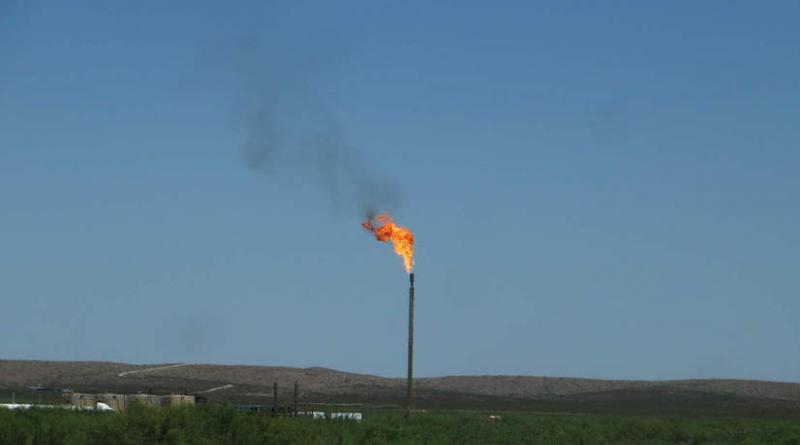It’s Time to Stop Calling Natural Gas a ‘Bridge Fuel’ to a Safe Climate, Says New Report.

Natural gas, marketed for years as a “bridge fuel” to cleaner energy sources, cannot be part of any climate solution, according to a new report from Oil Change International.
While its authors outline a range of arguments, the report, Burning the Gas “Bridge Fuel” Myth: Why Gas is Not Clean, Cheap, or Necessary, highlights this simple reason: There is no room for new fossil fuel development — natural gas included — within the Paris Agreement goals. Therefore, plans to transition to a natural gas-based system are incompatible with international climate goals.
“We simply have no more time to debate what’s already been settled. We must move swiftly to a fully renewable energy economy and leave all fossil fuels, including gas, behind,” said Lorne Stockman, report author and Senior Research Analyst for Oil Change International. “Despite desperate attempts by the oil and gas industry to persuade policymakers that their products have a future in a climate-safe world, a rational look at the data clearly shows otherwise.”
While this fact alone should be enough to counter the industry’s attempt to sell natural gas — which is mostly the potent greenhouse gas methane — as a “clean” fuel, there are plenty of other reasons to move on from all fossil fuels, including natural gas.
Renewables Plus Storage Are Already Economical — and Getting Cheaper
In 2013 when natural gas was being touted as a bridge fuel, the oil and gas industry could point to it as a cheaper alternative for producing electricity than coal. At the time, renewable energy sources and battery storage simply weren't cost-competitive with natural gas or coal.
That was a different time. The low cost of renewable energy has helped end the future of the coal industry and is now poised to do the same to natural gas. The concept of natural gas as a “bridge fuel” was based on the idea that the world needed a reliable and economical energy source to cover the transition until renewables plus storage were a viable alternative.
That time is now.
And this is happening as the world is awash in very cheap natural gas. In America, the price of natural gas has gone negative in places like the Permian Basin in Texas. In North Dakota, oil and gas producers are currently flaring 20 percent of the gas they produce because it isn’t worth capturing. Natural gas prices can’t go lower and can only go up from here.
Meanwhile, the costs of renewables continue to fall, and energy analysts predict that the costs of battery storage will continue dropping rapidly. The economics of renewables plus storage are competitive with natural gas now and appear poised to widen the gap in the near future.
Oil and Gas Industry Poised for a Fight
The oil and gas industry is quite open about its plans to either burn every last bit of oil and gas or turn it all into plastic and petrochemicals. There is no plan to “leave it in the ground.” The coal industry took the same approach but lost the economic argument once natural gas and renewables made coal energy obsolete in many places of the world.
However, the oil and gas industry in the U.S. and elsewhere is currently on a massive building spree, constructing new pipelines, drilling sites, refineries, and other infrastructure that, once built, serve to lock in future demand for natural gas. And anti-fossil fuel activists aren't the only ones suggesting that the U.S. is overbuilding gas pipelines, liquefied natural gas (LNG) export facilities, or petrochemical facilities to turn gas into plastics.
Natural gas producers realize that natural gas-fired power plants will help lock in future demand for their products. Once these plants are built, they will be used for decades, even if renewable energy is cheaper.
We can see examples of this business model now in attempts to prop up the struggling U.S. nuclear and coal industries. One example of how outdated infrastructure can still be profitable for an industry while a burden to ratepayers is a coal power plant that has been shut down in Wisconsin. Despite the coal plant not being in operation, ratepayers are expected to pick up the tab for another billion dollars over the next 20 years to pay for the remaining balance on the plant as well as profits to its owners — profits for a coal plant shut down because it wasn’t economical.
Oil and Gas Profits vs. a Livable Climate
Scientists say avoiding catastrophic climate change requires drastically reducing fossil fuel use. Meeting international climate goals and avoiding large-scale extinction of plant and animal life calls for rapidly decarbonizing the global economy, which is now a possibility with the low-and-dropping costs of renewable energy and storage.
However, this giant global shift would mean that oil and gas companies would follow in the footsteps of the failing coal industry. Major investors have begun to make financial decisions with this in mind. Last month, the Bank of Canadaacknowledged for the first time that climate change poses financial risks to Canada’s economy.
Meanwhile, companies like Exxon continue to fight efforts to make the company address climate change. The petrochemical billionaire Koch brothers continue their war on electric cars, which threaten their businesses. And the Trump administration continues its war on science.
If past is prologue, Exxon and the rest of the oil and gas industry will likely spend large sums of money trying to lock in future demand for their products while fighting the transition to renewable energy every step of the way.
That's despite acknowledging the economic viability of renewable energy in the hottest oil field in America — the Permian region in Texas and New Mexico. There, Exxon and the oil industry are choosing to power their fracking operations withsolar, wind, and battery storage despite the region being awash in cheap natural gas.
Renewables just make economic sense. While some oil and gas producers have opted out of burning natural gas, their so-called “bridge fuel,” when they need to buy new power, the industry's efforts to lock in future demand for natural gas is removing consumers' ability to follow suit.
3 June 2019
DESMOG



